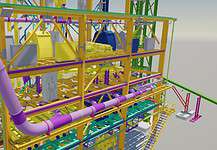MENTAL health groups are calling for cultural and organisational change in employer training and employee support for fly in, fly out (FIFO) and drive in, drive out (DIDO) workers, after one of Australia’s largest ever FIFO-DIDO mental health studies highlighted the potentially harmful psychological and lifestyle stressors of this unique working arrangement.
The study found there was a stigma attached to mental health problems in the FIFO-DIDO work culture, which inhibited employee’s acknowledgment of a problem and was one of three major barriers to employees seeking help.
Compounding this problem was an underlying lack of support services and employer training, along with a general lack of employee knowledge of the services available.
In a collaborative research project designed by suicide-prevention agency Lifeline and psychologists from Edith Cowan University, a sample group of 924 FIFO-DIDO workers were questioned in an anonymous online survey, to assess the impact of commuter arrangements on professional and private life quality.
The study exposed the propensity of some FIFO-DIDO workers to suffer depression-like symptoms, with family and home separation for longer work periods determined as a potentially significant cause of stress.
Negative cases of stress were found to be particularly prevalent in workers on high compression rotations, often manifesting in emotional withdrawal behaviours and deliberate disregard for personal needs.
The study found that this stress often led to negative lifestyle behaviours including drug or alcohol abuse, over-eating and lethargy, smoking or chronic fatigue from sleeplessness.
Lifeline WA chief executive Fiona Kalaf said there was a deficit in service awareness and accessibility, particularly in more remote areas.
“There are a number of supports available, but many of the FIFO-DIDO workers simply didn’t know about them.
When a new job is first started, there’s a barrage of information received; in amongst that is [information] about how to protect and nurture emotional wellbeing and mental health. But this may not be relevant at Day Zero,” Ms Kalaf said.
Ms Kalaf said mining companies needed to recognise the importance of timing,and give support information within more applicable and relevant timeframes.
“We found that it would instead be beneficial to have a scaffolding approach to knowledge over time, so that workers could build their knowledge of what supports were available.”
Ms Kalaf said managers and team leaders also needed greater specialised training to adequately handle problems when employees express concerns about their mental health and emotional wellbeing.
“There’s a lot in [occupational health and safety] about physical wellbeing, but there’s often a discomfort that comes through a lack of knowledge, for managers, in how to deal with someone who might be struggling emotionally,” she said. “Off the back of this research, Lifeline WA is partnering with the Australian Institute of Management to develop a small series of professional development courses, specifically aimed at leaders and managers, to equip them with the knowledge, the skills and the ability to lead a workforce through mental health and emotional wellbeing issues.”
Ms Kalaf said the report highlighted that the most pervasive barrier to mental health was the invasive trend of shame regarding mental health issues.
“The biggest problem of all was the problem of stigma: even if [employees] knew that they needed help, they had a sense of fear that they would be seen as ‘soft’ or ‘weak’…and that somehow this would be used against them – either semi-formally by their manager…that they aren’t strong enough to handle their work; or it might be used against them socially, [through teasing] by their workmates,” Ms Kalaf said.
In response to the findings of the study, researchers are now calling for an overhaul of the current FIFO-DIDO mental health support system, specifically emphasising the need to develop supports that focus on cultural change to increase help-seeking behaviour.
To reduce stigma on mental health literacy and coping skills, the study recommended implementing widespread support systems (before, during and after employment), that should be tailored to the needs of specific groups. Education and training were also stipulated as central initiatives to help ensure the improved ongoing FIFO-DIDO mental health.
Financial support to complete the study was generously provided by Raw Hire, a Pilbara-based company with significant FIFO-DIDO interests.
“This is a tough issue that Raw Hire was happy to get involved in and stand behind something we believe in that helps the community,” Raw Hire chief executive Byron Smith said.
“It is part of a continuing relationship with Lifeline WA to look in to the mental health of FIFO-DIDO workers and those who work in the resources industry.”
In a positive finding of the lifeline study, many FIFO-DIDO workers were determined to engage in mostly effective and healthy stress-coping behaviours, including seeking friends, exercising, relaxing, confronting the source, or general
acceptance of the situation.
The FIFO-DIDO commuter work system was also found to maintain sound intrinsic benefits, including high remuneration and extended quality-time with family during off-periods.
If readers or anyone they know needs help, they are encouraged to contact Lifeline 13 11 14 or crisischat.lifelinewa.org.au


























